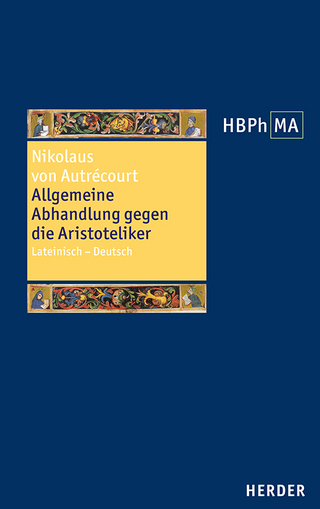
The Philosophy of Aquinas
Oxford University Press Inc (Verlag)
978-0-19-930123-2 (ISBN)
This new and updated edition of Christopher Shields and Robert Pasnau's The Philosophy of Aquinas introduces the Aquinas' overarching explanatory framework in order to provide the necessary background to his philosophical investigations across a wide range of areas: rational theology, metaphysics, philosophy of human nature, philosophy of mind, and ethical and political theory. Although not intended to provide a comprehensive evaluation of all aspects of Aquinas' far-reaching writings, the volume presents a systematic introduction to the principal areas of his philosophy and attends no less to Aquinas' methods and argumentative strategies than to his ultimate conclusions. The authors have updated the second edition in light of recent scholarship on Aquinas, while streamlining and refining their presentation of the key elements of Aquinas' philosophy.
Christopher Shields received his Ph.D. in Philosophy from Cornell University. Currently Shuster Professor of Philosophy and Concurrent Professor of Classics at the University of Notre Dame, he has also held permanent positions at the University of Colorado at Boulder, and the University of Oxford. In addition, he has held visiting posts at Cornell University, Yale University, St. Louis University, Stanford University, the Chinese University of Hong Kong, and the Humboldt University of Berlin. Robert Pasnau received his Ph.D. in Philosophy from Cornell University, and has taught at the University of Colorado Boulder since 1999. He is the editor of Oxford Studies in Medieval Philosophy and the Cambridge History of Medieval Philosophy and has published widely on both the history of philosophy and contemporary questions.
Preface
1 Life and Work
1.1 Early Years
1.2 A Young Scholar
1.3 Master of Theology
1.4 Back to Italy
1.5 A Second Term in Paris
1.6 Breakdown
2 Aquinas's Explanatory Framework: The Four Causes
2.1 Introducing the Four Causes
2.1.1 Matter and Form
2.1.2 The Efficient Cause
2.1.3 The Final Cause
2.1.4 The Four Causes Reviewed and Briefly Illustrated
2.2 The Four Causes Developed and Articulated
2.2.1 Mutual Priority
2.2.2 Priority Among the Causes
2.2.3 Proximate and Non-Proximate Causes
2.2.4 Causal Coincidence
2.2.5 Incidental Causes
2.3 Conclusions
3 Aquinas's Metaphysical Framework: Being and Essence
3.1 Beings and Essences
3.2 Material Substances
3.2.1 First Qualification
3.2.2 Second Qualification
3.2.3 Third Qualification
3.3 Immaterial Substances
3.4 Substance and Accidents
3.5 Universals
3.5.1 Qualitative Sameness
3.5.2 Numerical Sameness
3.6 Conclusions
4 God's Existence and Nature
4.1 Our Knowledge of God
4.2 Phase One: God's Existence
4.2.1 The Proof from Motion
4.2.2 The Proof from Degrees of Truth
4.3 Phase Two: God's Nature
4.3.1 Absolute Simplicity
4.3.2 From Intellect to Will
4.4 Understanding God's Attributes: Analogical Predication
4.5 Conclusions
5 The Order of the Universe
5.1 God's Power
5.1.1 Creation
5.1.2 Omnipotence and Creation
5.1.3 The Beginning of the Universe
5.2 The Created Order
5.3 Providence
5.3.1 Conservation
5.3.2 Necessity and Freedom
5.4 Conclusions
6 The Human Soul and the Human Body
6.1 The Special Status of Human Beings
6.2 Soul as a Principle of Life
6.3 Souls and Bodies: Hylomorphism
6.4 Against Reductive Materialism
6.5 Against Platonism
6.6 A Difficult Intermediary
6.7 Soul as Subsistent
6.8 Where in the Body Is the Soul?
6.9 Conclusions
7 Sense and Intellect
7.1 The Nature of Cognition
7.2 The Cognitive Powers
7.2.1 Sensation
7.2.2 The Immateriality of Cognition
7.2.3 An Argument for the Intellect's Immateriality
7.3 Cognitive Functions
7.3.1 The Objects of Intellect
7.3.2 Abstraction
7.3.3 Illumination
7.3.4 Concept Formation
7.4 Conclusions
8 The Goal of Human Life
8.1 Introduction
8.2 That There Is a Human End
8.3 Happiness
8.4 What Happiness Is Not
8.5 What Happiness Is
8.6 The Beatific Vision
8.7 Conclusions
9 Ethics
9.1 Overview
9.2 Natural Law
9.2.1 Nature and Eternal Law
9.2.2 Natural Inclinations
9.2.3 The Passions
9.3 Virtue
9.3.1 The Need for Virtue
9.3.2 The Perfection of Virtue
9.3.3 Prudence
9.4 Conclusions
Glossary
Catalog of Works
Index
| Erscheinungsdatum | 14.05.2016 |
|---|---|
| Verlagsort | New York |
| Sprache | englisch |
| Maße | 229 x 146 mm |
| Gewicht | 729 g |
| Themenwelt | Geisteswissenschaften ► Philosophie ► Philosophie des Mittelalters |
| ISBN-10 | 0-19-930123-9 / 0199301239 |
| ISBN-13 | 978-0-19-930123-2 / 9780199301232 |
| Zustand | Neuware |
| Haben Sie eine Frage zum Produkt? |
aus dem Bereich


